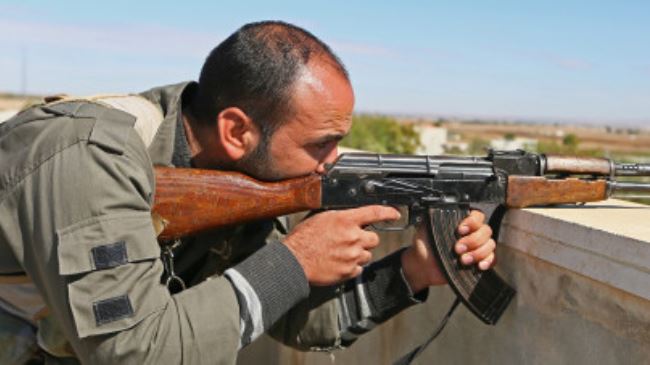[caption id="attachment_120442" align="alignright" width="193"] A member of Kurdish forces takes position on the roof of a house during clashes with the ISIL Takfiri terrorists around Kobani, September 30, 2014.[/caption]
A member of Kurdish forces takes position on the roof of a house during clashes with the ISIL Takfiri terrorists around Kobani, September 30, 2014.[/caption]
Kurdish fighters in Syria’s border town of Kobani are getting the upper hand as urban warfare rages on between them and the ISIL Takfiri terrorists.
According to reports on Wednesday, the Kurdish fighters, who know the battle field in the area much better than the Takfiris, have driven the militants out of several areas in the southern part of the strategic town.
Mustafa Ebdi, a Kurdish journalist and activist from Kobani, stated in a message posted on Facebook that the streets of the Maqtala neighborhood in southeastern Kobani are full of the bodies of ISIL terrorists.
The Kurdish journalist, however, alarmed that the “humanitarian situation is difficult and people need food and water.”
The so-called Syrian Observatory for Human Rights has also confirmed that the terrorists have pulled back from several areas of Kobani.
Rami Abdel Rahman, the observatory director, said the ISIL militants “withdrew overnight” from several areas in the east of Kobani and its southwestern edges.
He further noted that the Kurdish fighters have managed to clear the western part of the town of the Takfiri militants.
Meanwhile, Kurdish officials say airstrikes carried out by the US-led coalition against ISIL positions in Syria are not working.
“There’s a valley to the south-west of Kobani that had 2,000 ISIL vehicles in it for 11 days, yet the Americans have never targeted them. It’s as if they only want to scare them or do a little damage,” said Ahmed Shekho, the head of the Syrian Kurdish students union.
“Now that ISIL are in the eastern side of the town, a street war has started. It is like gang warfare,” Shekho stated, adding that the fighters know every street.
“ISIL are better armed but when it comes to street fighting, maybe the situation could be different.”
The intense fighting for the strategic town has forced nearly 200,000 people to take refuge in Turkey.
By Press TV
The Iran Project is not responsible for the content of quoted articles.

 QR code
QR code